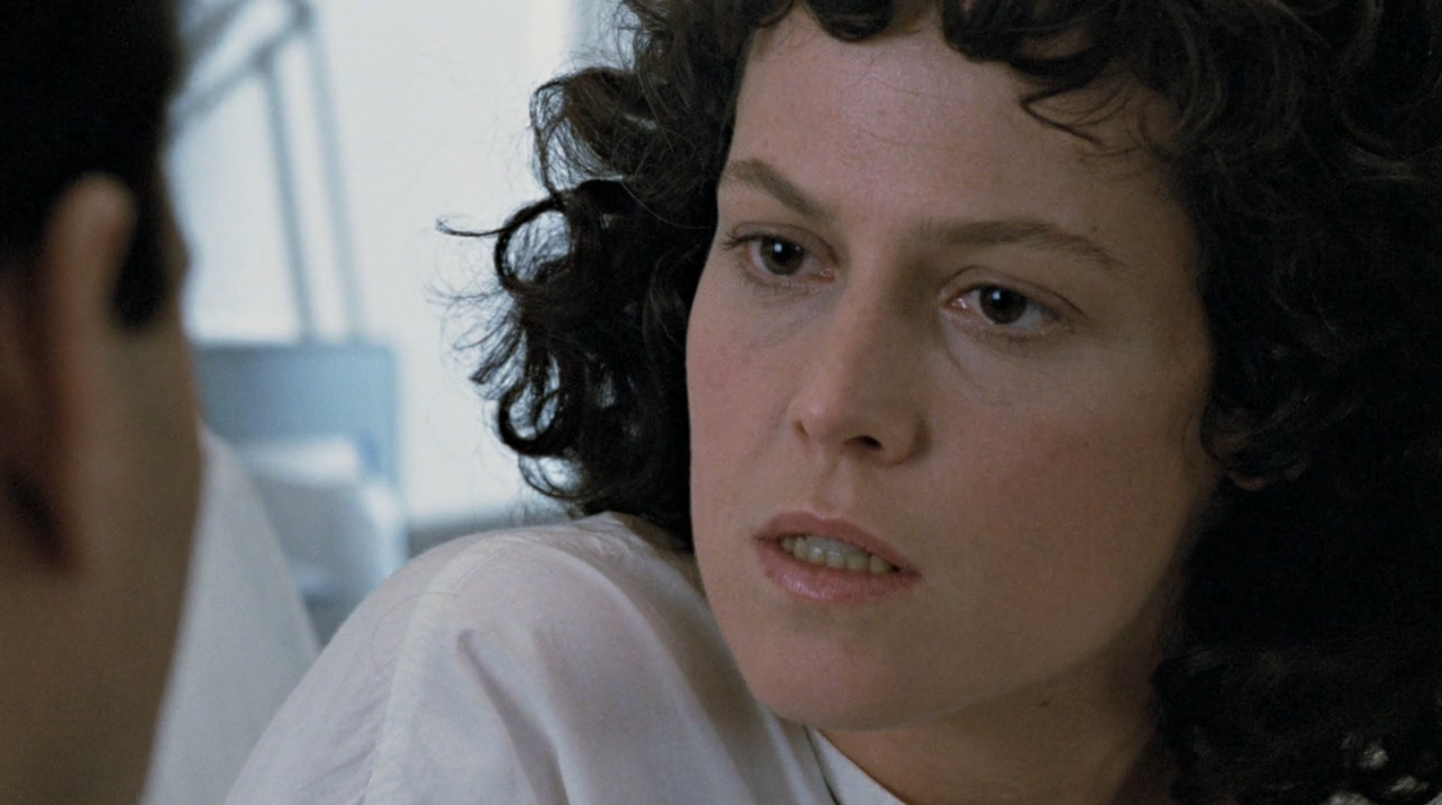by Nathaniel R

How long was I out. HOW LONG? Please."
This week I had the pleasure of guesting on InSession's podcast to discuss James Cameron's sci-fi/horror classic Aliens (1986). When they asked me to guest on the show I secretly thought "What more can I say about it? I've been talking about this movie forever!" but then of course I couldn't shut up and the episode was too short for me to squeeze in everything that was inside of me. So herewith some notes and, of course, the podcast itself...
• Sigourney Weaver's gift with line readings is immense. She's so minimalist playing no-nonsense Lt. Ellen Ripley that every little inflection carries weight or rewatchable thrill. Even the simple way she converses with the latest Company man she meets (Paul Reiser, in full snake mode) is the work of an actor in deep control of her characterization. Notice how uncharacteristically soft her voice is, genial with even a hint of girlishness on a couple of words when she's first trying to get acclimated and meeting him and then how abruptly the amiability vanishes when she realizes things are off. The hardness of "How long?" with the quieter "please", less soft than matter of fact polite.


• Jonesy the cat is one of the greatest cats in cinema. And what a sly thing to have Jonesy hissing after a cuddle as the sound cue that slides you into a (literal) nightmare. After the next nightmare she tells Jonesy "it's all right" over and over which is so authentic. People talk to their pets all the time and often, in some small or large way, they're also talking to themselves. (It wasn't Jonesy having the nightmare, after all.)

"Did IQs just drop sharply when I was away?"
• LOL A+ read. Ripley never has the patience to suffer fools.

• A dialogue free shot that just resonates. Ripley has had a haircut which the film doesn't mention. But it's placed EXACTLY between Sigourney's angry confrontational disbelief when she hears there is a colony with 70 families on LV426 and the subsequent scene when they inform her they've lost contact with LV426 just as they would have known if they had been listening to her.

• Aliens imagined a fully co-ed military before Starship Troopers (or the actual US Army)

• Look at this shot of Corporal Hicks (Cameron's original go-to star, Michael Biehn) and Sergeant Apone. They're watching Ripley reveal yet another skill. One of the other forward things about Aliens and a subtle reason that the film reads so feminist (aside from the obvious reason of Ripley herself) is how much any man coded as "good" is either impressed or delighted by Ripley's total badassery, quick-thinking, and utter competence. Or learns to be impressed quickly. The respect just flows off of Corporal Hicks especially (from beginning to end) and his relationship to Ripley is one of mutual admiration which is why its so sexy in a non-carnal way. She underlines and supports his authority (military-wise) to the other characters but he totally understands that she's the smartest person in the room, defers to her expertise, and is totally okay with being rescued by her.
Anyway I could talk about this movie for days but why keep you from the podcast by going over each scene? And we've only talked about this first half hour.
Cameron is so patient at building the tension, but there's no padding. Everything adds to the overall effect and story. We don't see the first alien for nearly an hour after which the movie transforms into pure action cinema. In Cláudio's recent piece on Jamie Lee Curtis's wonderful performance in James Cameron's True Lies (1994) he talked about her delightful comic precision and her strong 'if less precise' action physicality. Here in Aliens (1986) we see a textbook example of another rarer acting skill combo: dramatic force with ultra precise action physicality. Weaver's body language and movement is so perfectly judged, and so character consistent, and so strong that you buy everything about Ripley, from her PTSD, to her bold confrontational nature with authority figures, to the exact pinpoint moment whenever her adrenaline and morality click-in to override the fear and trauma when people need her. Even the way she breathes is thrilling in the movie's lengthy dialogue-free action setpiece when Ripley sets out to rescue Newt and meets the Queen Mother.

Oscar fanatics love to talk about the moment an actor earned an Oscar nomination for their performance. More often than not that's just a particularly juicy dramatic "clip" ... crying, shouting, you know the drill. Less often it's a soon to be iconic movie moment, a true serotonin surge for audiences everywhere. I'd argue that Weaver's Oscar nomination came from the latter. It was a done deal the moment she tilted her head in that standoff with the Queen Mother, a psychic "Oh you thought you'd try me?" before torching all the eggs.
Ripley forever. The greatest action heroine of all time.